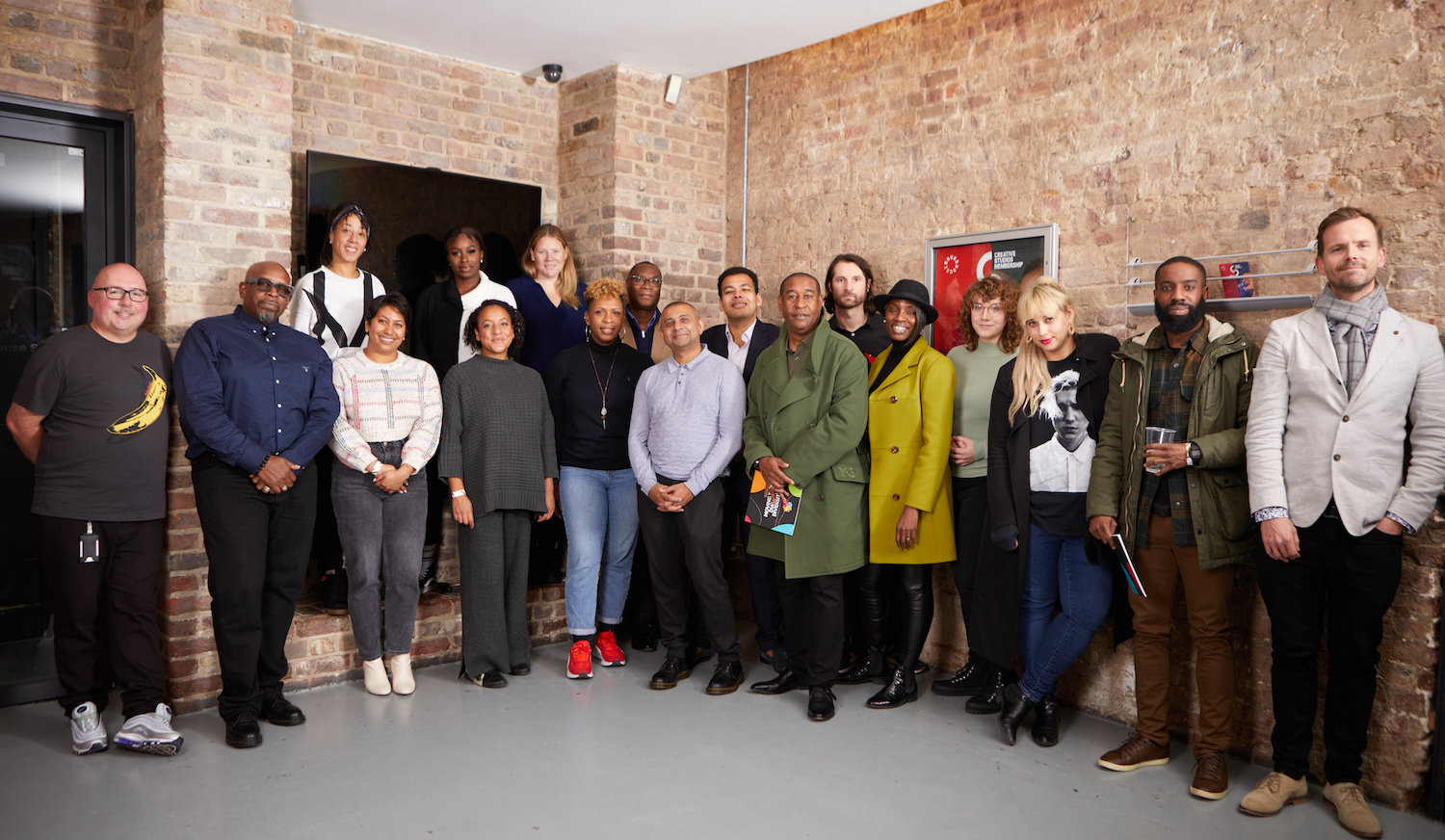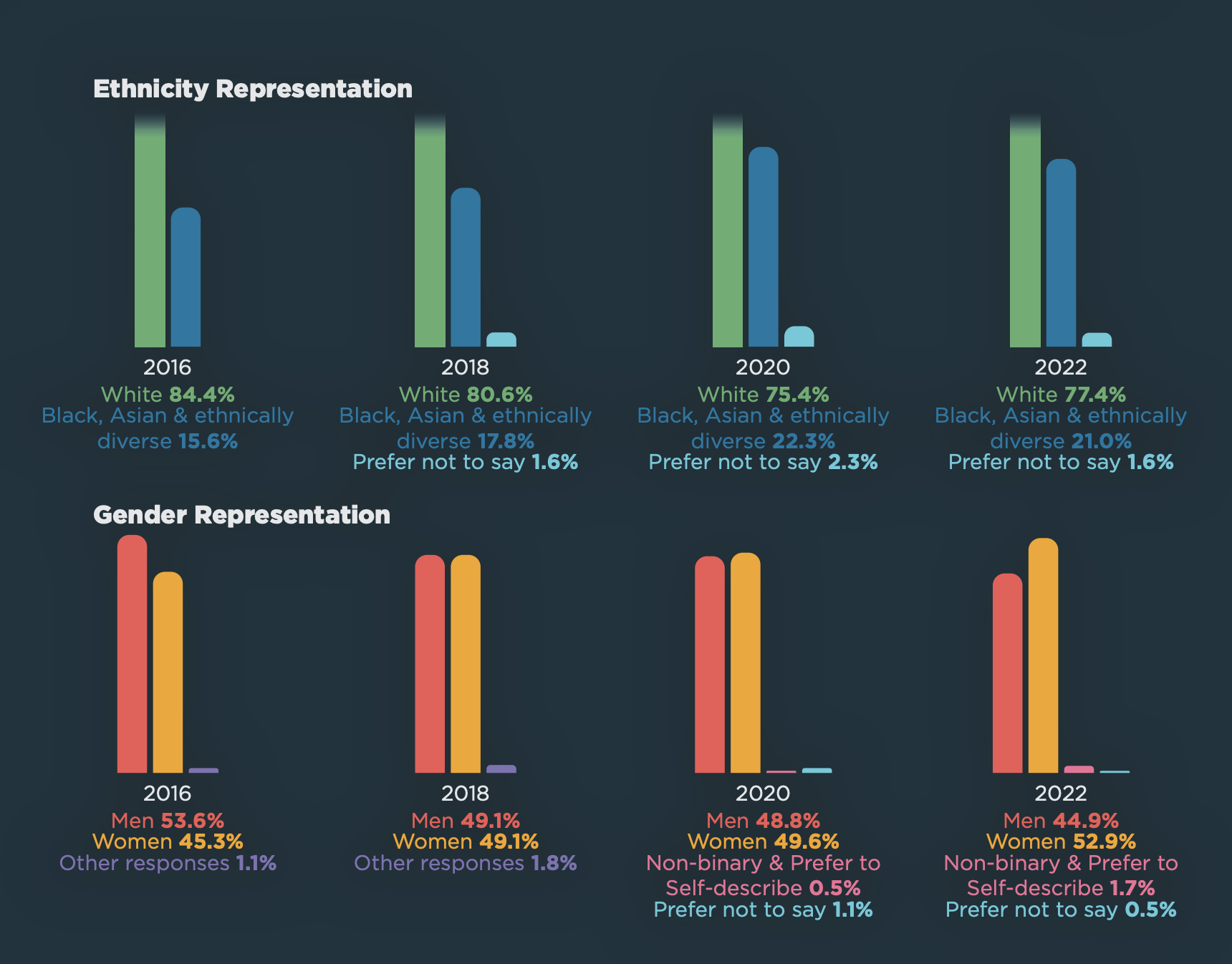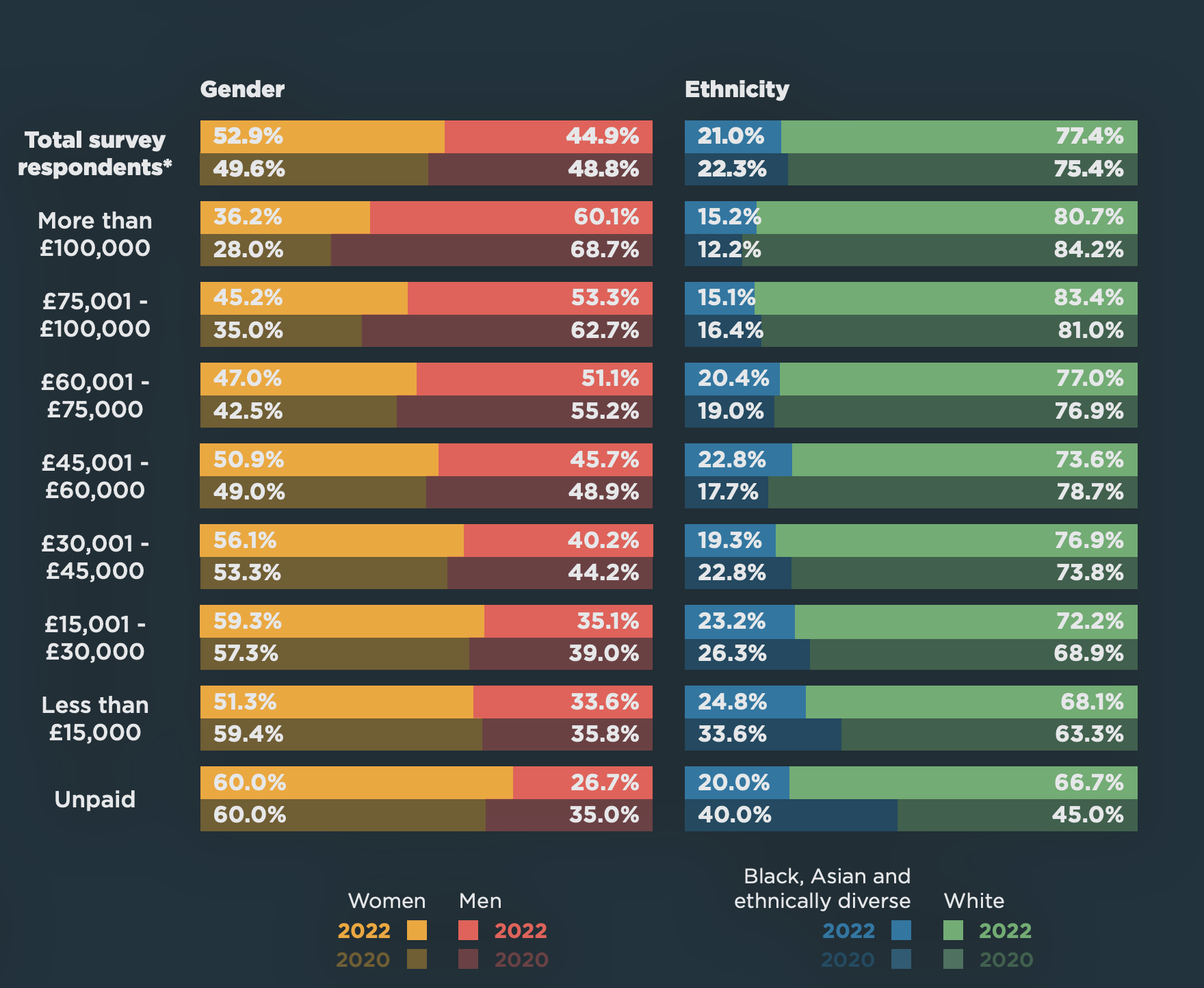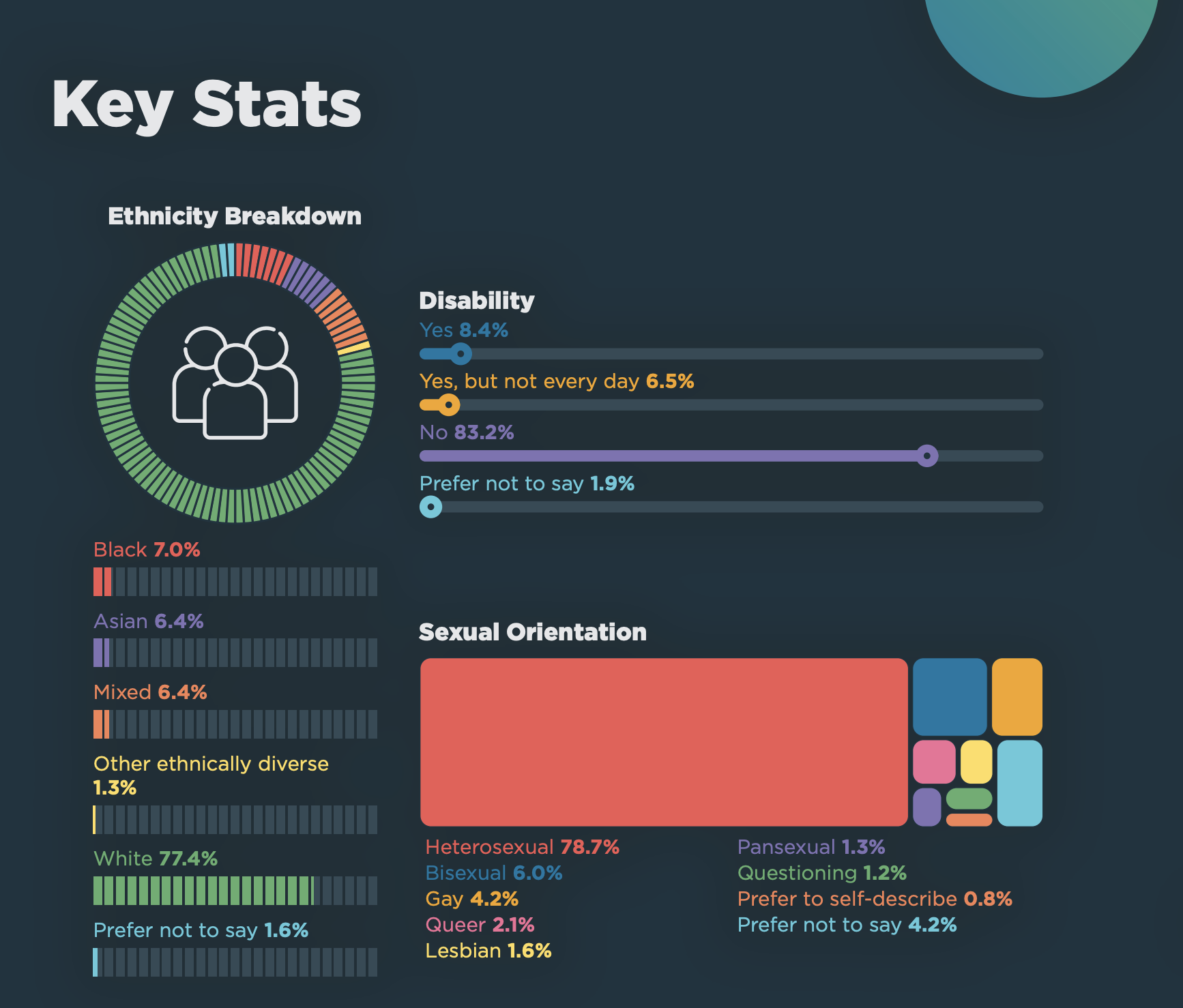Diversity has been at the top of the policy agenda for the music industry in recent years. But a new report reveals a decline in ethnic diversity in terms of representation among the workforce.
UK Music has revealed the findings of its 2022 Workforce Diversity Survey, as part of its UK Music Diversity Report. A total of 2,980 people responded to the survey, which focuses on the music industry workforce (not music creators).
The trade body has also unveiled an action plan with 15 key recommendations to improve diversity across the music industry.
Since its launch in 2016, the survey has tracked progress to boost diversity and inclusion in the UK’s music industry, which supports 145,000 jobs.
The report reveals that the number of women has reached a record high and that women now make up the majority. The proportion of those in mid and senior levels has also increased since the last survey in 2020. However, the survey does show that women do start to leave the industry in their mid-forties.
There is a worrying drop in some parts of the industry when it comes to the ethnic diversity of the workforce, following the positive progress in UK Music’s last survey two years ago. One possible explanation is that those employees from Black, Asian and ethnically diverse communities have been disproportionately affected by the impact of Covid-19, which saw total jobs in the sector fall from a pre-pandemic high of 197,000 to 145,000 in 2021.
The survey is overseen by UK Music’s Diversity Taskforce (pictured below).
UK Music chief executive Jamie Njoku-Goodwin (pictured, top) said: “The findings of our 2022 survey have been incredibly revealing, and show that while we are making progress, there remains much more we need to be doing to break down the barriers that still block people from succeeding in our industry.
“This year, we have gone deeper than ever before, not just trying to gather as rich a dataset as we can, but also digging below the surface to try and understand the disparities we often see across the industry.”
Read on for the key findings of the UK Music Workforce Diversity Survey 2022...
ETHNICITY
There has been a decrease in the total number of employees from ethnically diverse communities compared to the 2020 survey results. Just over one fifth (21.04%) of individuals working in music identify as Black, Asian or from an ethnically diverse background. This is down from 22.3% two years ago.
The number of Black, Asian and ethnically diverse respondents aged 25-34 rose from 24.8% in 2020 to 26.3% in 2022, which suggests that efforts to improve career progression may be starting to have an effect.
In entry-level positions, the number of Black, Asian and diverse ethnicity employees fell from 34.6% in 2020 to 23.6% in 2022. At a senior level there was a drop from 19.9% in 2020 to 18.3% in 2022.

GENDER
There has been an increase in the total number of women employees in music compared to the 2020 survey. The report shows that 52.9% of individuals working in the music industry in 2022 identified as a woman, which has risen from 49.6% in 2020.
The number in mid-level roles has increased from 40.4% in 2020 to 45.1% in 2022, and those in senior roles was up from 51.2% in 2020 to 53.3% in 2022.
It is still the case that more young women are accessing the industry at an early stage but start to leave the industry in their mid-forties. Women are well represented in the 35-44 age category (53.0%), but the 45-54 age bracket (44.3%) is the point at which female representation starts to drop off, with the numbers reducing further for those aged 55-64 (33.3%).
UK Music has also tracked gender and ethnicity representation based on income level.

MENOPAUSE
For the first time, UK Music has used the survey to collect data relating to menopause and the impact this could be having on careers.
More than one in 10 (11.2%) respondents said they have experienced menopause/perimenopause, with 47.5% of them reporting that their work was affected by its symptoms. But three quarters of these respondents (76.6%) have not taken time off work to manage their symptoms.
DISABILITY
According to the survey, 14.9% of the industry reported a disability, up from 12.2% in 2020. This could indicate that more individuals with a condition are working within the industry or that a greater number of individuals are comfortable disclosing their condition.
Two-thirds (67.2%) of those who have a disability said they felt they had to compromise their health for work.
The survey showed that 7.5% of those working at senior level declared a visible disability, with the greatest representation of disabled respondents at apprentice or intern level (13.6%).
PARENTS & CARERS
The survey revealed that parents and carers are underrepresented in the music industry (at 29.7%, compared to 44% of the UK working population). More men than women in the survey have care responsibilities but the majority of primary parents or carers are female.
Mothers and female carers are almost three times more likely to turn down work opportunities than men (72.3 compared to 25.5%). According to the survey, 13.8% of parents and carers report being denied work because of care responsibilities, nearly all of which were women.
However, there are positive steps being taken In 2022, Sony Music UK introduced equal parental leave, flexible working and a new childcare scheme, that provides employees with funding towards the cost of childcare.
SEXUAL ORIENTATION
According to the survey, 78.7% identified as heterosexual, with 6% bisexual and 4.2% who preferred not to say. The survey also showed 4.2% identifying as gay, 2.1% as queer, 1.6% as lesbian and 1.3% as pansexual.

GENDER IDENTITY & ASSIGNED SEX
The survey collected data on gender and assigned sex, with 1.4% of respondents saying their gender identity is different to their sex assigned at birth. Of these respondents, a majority identified as non-binary, while a small percentage said they prefer to self-describe.
Of those who identified as non-binary, the majority are working as apprentices or interns, with the number decreasing as the career level rises.
SOCIAL MOBILITY
Understanding the relationship between an individual’s upbringing and the impact it has on career opportunities and development will form a new area of focus for the UK Music Diversity Taskforce in 2023.
For the first time, the latest survey asked respondents to describe their social class, although only a fifth answered.
Almost half (47.9%) of respondents identified as middle class with over a third (37.0%) identifying as working class. Of those who identified as working class, 71.9% were White, with Black respondents accounting for 11.9% and Asian 4.7%. Working class respondents are primarily at a mid level in their career (43.5%), with almost a third (32.4%) at senior level.
ACTION PLAN
In addition to publishing the 2022 survey results, the UK Music Diversity report also sets out a new music industry action plan.
The plan outlines suggested policies drawn both from UK Music’s survey findings and the lived experiences of those from diverse communities via a series of round-table events.
The 15 recommendations in the plan include: cultivating a transparent, safe and consciously inclusive culture for all staff; increasing opportunities for underrepresented groups; working towards a five-year EDI strategy and vision; incorporating EDI into every part of an organisation or businesses structures; publishing data on gender, ethnicity and disability pay gaps annually in larger employers; and ensuring there is a strong EDI mindset at the heart of all tendering and procurement processes.
The recommendations build on the foundations laid out in 2020 in UK Music’s Ten-Point Plan for the sector.
“Boosting inclusion is mission-critical to the future success of our sector,” said UK Music chief executive Jamie Njoku-Goodwin. “Whether it’s businesses and organisations who need the broadest range of talent to draw on, or individuals who want to forge a successful career in our industry regardless of their background, it’s in all our interests to make sure the music industry is genuinely open and accessible to all. We still have a way to go, but UK Music is committed to achieving this – and this report sets out the path.”
UK Music Diversity Taskforce chair Ammo Talwar said: “Our 2022 survey shows how those from Black, Asian and other diverse communities have been hardest hit by the impact of Covid-19. The drop in the percentage of employees in several sectors of the industry is further evidence of why we must not take our foot off the accelerator when it comes to driving positive changes on diversity and inclusion as swiftly as we can.
“We need to create a consciously inclusive culture right across the music industry and right across the UK. Our hope is that our Music Industry Action Plan provides a robust and clear framework that anyone can use to help deliver that change.”
UK Music Diversity Taskforce vice-chair Paulette Long said: “The challenge for the music industry is how we use the plan to move beyond the work that is already under way with the industry’s membership organisations and ensure that it is rolled out into the wider music business and creative community.”












